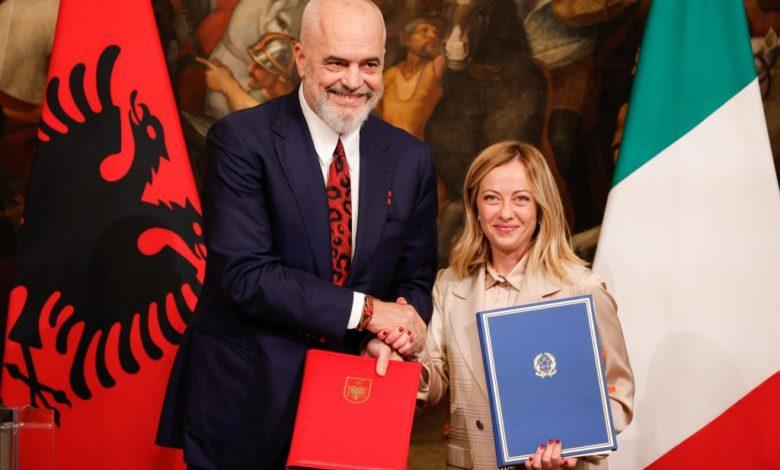
The signing of an immigration agreement between Albania and Italy sparked widespread controversy in the Albanian capital, Tirana, as the Albanian opposition criticized Prime Minister Edi Rama and expressed its fear of a migration crisis in Albania.
The agreement signed by the head of the far-right Italian government, Giorgia Meloni, and her Albanian counterpart, Edi Rama, stipulates that Italy will construct two buildings in this country, which is not a member of the European Union, to accommodate migrants rescued in the Mediterranean Sea in order to “accelerate the processing of asylum applications or potential returns” to the countries of origin.
The Albanian opposition entered the battlefield against Prime Minister Edi Rama, after he signed this agreement with his Italian counterpart, Giorgia Meloni, in Rome, according to the “InfoMigrants” website.
Deputy Speaker of Parliament, Agron Gjekmarkaj, a member of the opposition Democratic Party, said, “Although we are grateful to Italy for what it has done over the past 33 years to support us, we are not yet ready to take such a step.”
Gjekmarkaj added, “The Meloni government is under great pressure regarding managing the crisis resulting from the large influx of migrants, but the Rama government should not transfer this crisis to Albania.”
Gjekmarkaj also warned that establishing facilities to accommodate migrants in the port of Shengjin “will erase the dream of this important coastal location in the northern part of the country for tourism development.”
For his part, the head of the Democratic Party, Lulzim Basha, criticized what he considered a lack of transparency on the part of the Prime Minister, who “does not have any mandate to negotiate with any country,” and explained that “Italy is our ally, partner, and friend, but here we are talking about national interests.”
For its part, a spokeswoman for the European Commission explained that, according to “preliminary information,” this agreement is not similar to the one concluded in 2022 between the United Kingdom and Rwanda, which was criticized by the European Commissioner for Home Affairs, Ylva Johansson.
The Swedish official considered at the time that “seeking external sources to complete asylum procedures is not a humane and decent immigration policy.”
For her part, Erida Skendaj, an Albanian expert in human rights and the rule of law, said, “In many cases, refugee camps have shown in European Union countries a number of problems with respect to the rights of these people. As far as Albania is concerned, all these risks will worsen and increase.”
The two centers, which will be managed by Italy in Albania, will be ready to operate by spring 2024, to accommodate up to three thousand migrants, or about 39 thousand people annually.





